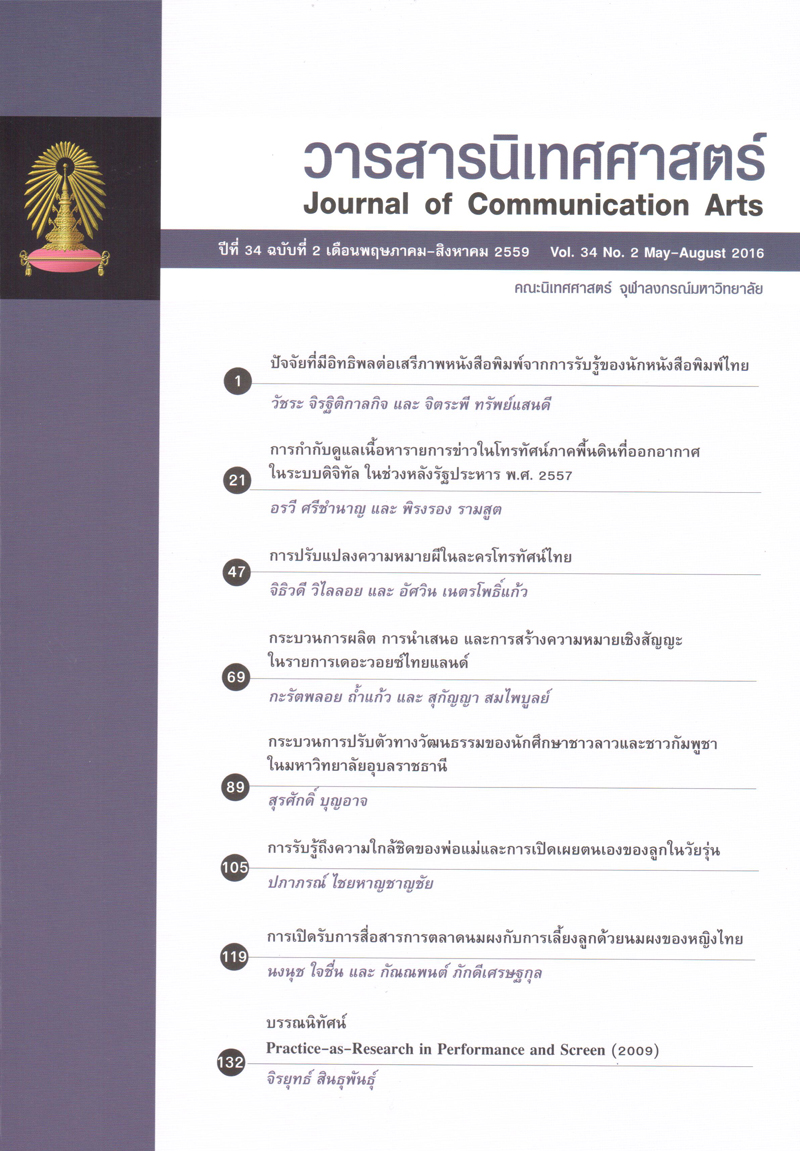การกำกับดูแลเนื้อหารายการข่าวในโทรทัศน์ภาคพื้นดินที่ออกอากาศในระบบดิจิทัล ในช่วงหลังรัฐประหาร พ.ศ. 2557
Main Article Content
Abstract
การศึกษานี้มีวัตถุประสงค์เพื่อศึกษาบทบาทในการกำกับดูแลเนื้อหารายการข่าวของผู้ประกอบการสื่อ องค์กรวิชาชีพสื่อและองค์กรกำกับดูแลที่เป็นอิสระของรัฐในโทรทัศน์ภาคพื้นดินระบบดิจิทัลและปัจจัยที่มีอิทธิพลต่อการกำกับดูแลเนื้อหารายการข่าว ตลอดจนแสวงหาแนวทางการพัฒนาและปรับปรุงการกำกับดูแลเนื้อหารายการข่าวในโทรทัศน์ภาคพื้นดินระบบดิจิทัล โดยรวบรวมข้อมูลด้วยการวิจัยเอกสาร ประกอบกับการสัมภาษณ์เชิงลึกผู้มีส่วนเกี่ยวข้อง ผลการวิจัยพบว่า การกำกับดูแลเนื้อหารายการข่าวในโทรทัศน์ภาคพื้นดินระบบดิจิทัล โดยองค์กรกำกับดูแลของรัฐในช่วงของการปกครองภายใต้คณะรักษาความสงบเรียบร้อยแห่งชาติ (คสช.)ให้ความสำคัญกับเนื้อหาด้านการเมืองเป็นลำดับแรก โดยใช้ประกาศคณะรักษาความสงบเรียบร้อยแห่งชาติ (คสช.) ฉบับที่ 97/2557 และฉบับที่ 103/2557 ควบคู่ไปกับการใช้มาตรา 37 แห่ง พรบ.ประกอบกิจการกระจายเสียงและกิจการโทรทัศน์ พ.ศ. 2551 นอกจากนี้พบว่าในส่วนของการกำกับดูแลกันเอง ทั้งในระดับองค์กรสื่อและระดับสภาวิชาชีพ/องค์กรวิชาชีพข่าวยังคงมีลักษณะที่ไม่เข้มแข็งและปรากฏการออกอากาศเนื้อหาข่าวที่ไม่เหมาะสมอย่างต่อเนื่อง จึงควรส่งเสริม กระบวนการกำกับดูแลเนื้อหาและกระบวนการรับเรื่องร้องเรียนให้มีประสิทธิภาพมากขึ้นประกอบกับการบังคับใช้มาตรการทางจริยธรรมอย่างเคร่งครัด
The Regulation of Content of News Program in Digital Terrestrial Television after the 2014 Coup
This research is a qualitative study and has the following objectives – to study factors influencing regulation of news content in digital terrestrial television stations (DTT), to examine news content regulation role of the following players – the independent regulator of the state (the National Broadcasting and Telecommunications Commission or the NBTC), professional media organizations (self-regulatory organizations or SROs), and news media operators; and to develop approaches for news regulation for DTT. Data was collected through document research of academic literature, related laws, and announcements of regulatory organizations from local sources and in the overseas as well as through in-depth interviews with key informants from the following groups – 1) 14 DTT operators – public service and commercial, 2) representatives from four media SROs, and 3) four senior executives who are policy makers related to content regulation at the NBTC.
The research has these findings. News content regulation in DTT tends to prioritize political news. This is a direct result of the political context under the rule of a military regime led by the National Council for Peace and Order (NCPO) after the coup in May 2014. The NCPO has appointed a working group to monitor the media in all channels including television. This working group will notify the NBTC each week of their monitor result so that the NBTC’s content regulation board could consider the problematic content whether it falls under section 37 of the Broadcasting Act which is the provision on forbidden content. They also use new rules like the NCPO Announcement # 97 and # 103 which are on public dissemination of information as framework for their consideration. In addition, the NBTC also uses other regulatory tools including time zone, content rating, and licensing conditions.
The research also finds that media SROs are still quite ineffective when it comes to news content regulation as evidenced in continuous airing of inappropriate and unethical content. The SROs studied also lack clear regulatory and complaints-handling system. Furthermore, filtering technology that is available for DTT has not yet been tapped for content regulation or to encourage public participation in content monitor.
The study recommends that self-regulation of news content by SROs be strengthened by standardizing the complaints-handling process, invigorating enforcement mechanisms, and promoting public perception about SROs as well as building public trust in their self-regulation system.


